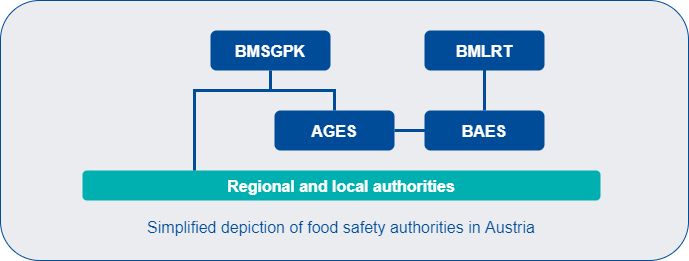Difference between revisions of "Austria:Austria"
Lindenlaub (talk | contribs) |
|||
| Line 1: | Line 1: | ||
{{#drawio:Austria|max-width=650px}} | {{#drawio:Austria|max-width=650px}} | ||
''© worldfoodsafetyalmanac.bfr.berlin'' | |||
Revision as of 11:35, 23 September 2021
© worldfoodsafetyalmanac.bfr.berlin
The Food Safety and Consumer Protection Act is the central legal foundation for food legislation in Austria. Infringement of food regulations can lead to measures under criminal law and consumer damage claims under civil law, whereby the final decision rests with the courts. Government measures with regard to food safety are often based on scientific risk assessments. However, the final decision on the legality of governmental measures rests with the courts.
In Austria, risk assessment and risk management are largely institutionally separated. Risk assessments are published on the Internet.
Federal Ministry of Social Affairs, Health, Care and Consumer Protection
| Name | Federal Ministry of Social Affairs, Health, Care and Consumer Protection |
|---|---|
| Acronym | BMSGPK |
| Activities |
|
| Responsibilities | |
| Location | Vienna |
| URL | https://www.sozialministerium.at/en |
The Federal Ministry of Social Affairs, Health, Care and Consumer Protection (BMSGPK) prepares draft legislation in the field of food safety based on scientific risk assessments conducted by the Austrian Agency for Health and Food Safety (AGES). The BMSGPK is responsible for the coordination of state food inspections and can issue national regulations in the area of food safety.
The BMSGPK’s portfolio includes food, novel foods, food supplements, genetically modified organisms (GMOs), zoonoses, mineral water, drinking water, residues of plant protection products and veterinary drugs, medical devices and medicinal products. Furthermore, the BMSGPK is responsible for approving pilot studies with regard to the cultivation of genetically modified plants. It is also responsible for approving the use of GMOs in conjunction with food and feed.
The remit of the BMSGPK extends beyond food safety to include animal health and animal welfare, for example.
Federal Ministry of Agriculture, Regions and Tourism
| Name | Federal Ministry of Agriculture, Regions and Tourism |
|---|---|
| Acronym | BMLRT |
| Activities |
|
| Responsibilities | |
| Location | Vienna |
| URL | https://www.bmlrt.gv.at/english/ |
The Federal Ministry of Agriculture, Regions and Tourism (BMLRT) is responsible for agricultural policy and food safety during primary food production. It prepares draft legislation in the field of feed and groundwater based on scientific risk assessments conducted by the Austrian Agency for Health and Food Safety (AGES). The BMLRT is authorised to issue national regulations with regard to feed and groundwater.
The work of the BMLRT is supported by the Federal Office for Food Safety (BAES). The BMLRT’s area of work extends beyond the field of food safety to include plant health and plant protection.
Austrian Agency for Health and Food Safety
| Name | Austrian Agency for Health and Food Safety |
|---|---|
| Acronym | AGES |
| Activities |
|
| Responsibilities | |
| Location | Vienna |
| URL | http://www.ages.at/en/ |
The Austrian Agency for Health and Food Safety (AGES) is a limited liability company (GmbH) owned by the BMSGPK and BMLRT. AGES has a mandate from the Republic of Austria to prepare scientific risk assessments and conduct transparent risk communication with the public at large, scientists and other interested or involved groups. Independent of any scientific, political or social interests AGES prepares scientific risk assessments, identifies new health risks and prepares recommendations for risk reduction. AGES risk assessments are used by the BMSGPK and the BMLRT and by local authorities as the foundation for their management measures.
AGES’ remit includes food and feed safety, novel foods, food supplements, GMOs, zoonoses, mineral water, residues of plant protection products and veterinary medicinal products. AGES is also active in the fields of animal health, plant health, plant protection, soil health, fertilisers, seeds, bee health, radiation protection, medicines and medical devices. AGES is also involved in active research. AGES has scientific analytical laboratory facilities for all of its areas of activity.
There are 60 National Reference Laboratories pursuant to Regulation (EC) No. 2017/625 and reference laboratories in the fields of veterinary medicine and human medicine attached to AGES.
The regulatory authority for veterinary drugs is assigned to the Federal Office for Safety in Health Care (BASG). The BASG is also an authority within the organisational structure of AGES. The BASG issues and monitors the market authorisation of medicinal products and other medical devices.
Federal Office for Food Safety
| Name | Federal Office for Food Safety |
|---|---|
| Acronym | BAES |
| Activities |
|
| Responsibilities | |
| Location | Vienna |
| URL | http://www.baes.gv.at/en/ |
The Federal Office for Food Safety (BAES) was established by the Austrian Health and Food Safety Act. It is associated with AGES. AGES provides the BAES with the manpower and the infrastructure needed to execute its sovereign functions as a federal authority. The BAES is responsible for the coordination and implementation of state inspections of animal feed. It is also the regulatory authority for plant protection products. The area of work of the BAES extends beyond the field of animal feed to include plant health.
Regional and local levels
Austria consists of nine federal states which are divided into 117 districts. Each district is further subdivided into several municipalities. Depending on the distribution of statutory competencies, the responsibility for the implementation of food inspections is held by federal authorities or regional authorities of the nine federal states.
The BMSGPK has transferred the coordination and implementation of federal inspections for all aspects of food safety to the federal states of Austria (food safety inspections are conducted at a regional and local level).
In contrast, the coordination and implementation of animal feed inspections is not delegated to the federal states, it is responsibility of the BAES (national level).
| Institutions involved in the EFSA network pursuant to Article 36 Reg. (EC) No. 178/2002 |
|---|
|
